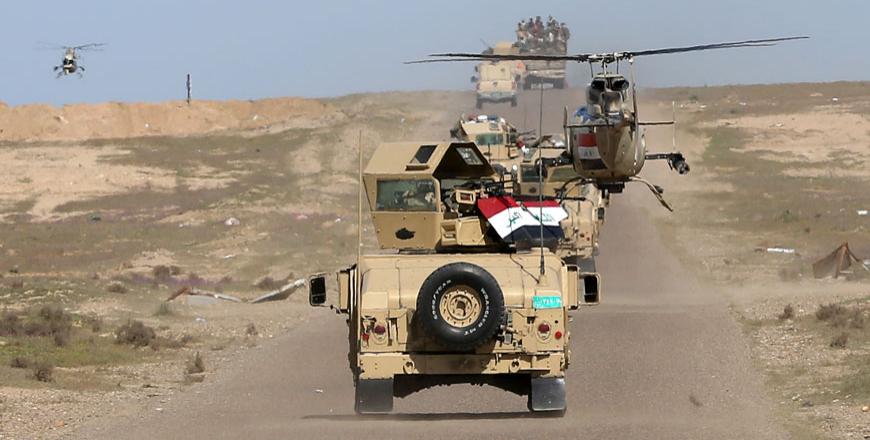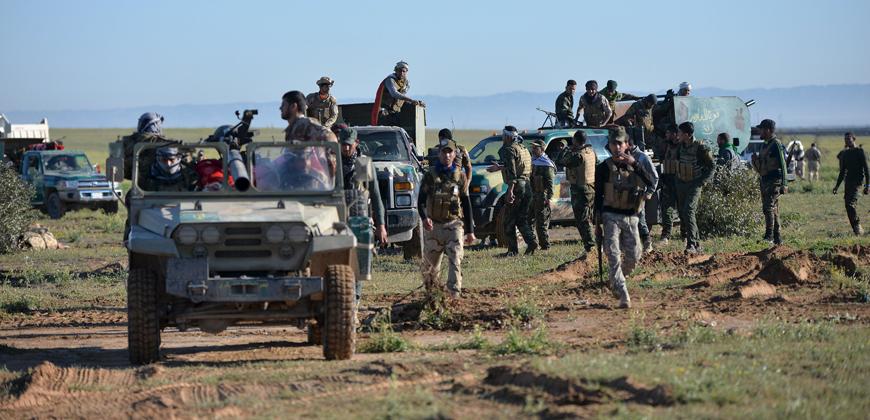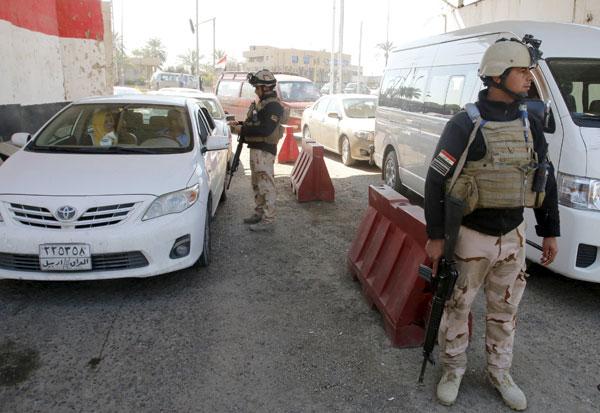You are here
Iraq’s military falls short on logistics in fight against Daesh
By AP - Mar 10,2016 - Last updated at Mar 10,2016

In this Wednesday photo, Iraqi Defence Minister Khaled Al Obeidi’s convoy tours the front line in Anbar, Iraq (AP photo)
SALAHUDDIN, Iraq — Iraq's military is once again trying to dislodge Daesh militants from the vast Samarra Desert, which stretches between newly recaptured territory in Anbar province and the Daesh-held northern city of Mosul. Yet, as operations move further away from the capital, government forces are increasingly plagued by logistical shortcomings.
Iraq's Minister of Defence Khalid Al Obeidi on Wednesday toured Camp Speicher, a military base 130 kilometres north of the capital, Baghdad. Surrounded by a crowd of assistants and military officials, he carefully asked commanders about food supplies, weapons deliveries and training.
"He's very detail-oriented, during the previous administration the Iraqi military had a lot of issues with troops not being fed, in addition to, you know, the larger payroll issues," said an official from the minister's office.
He was referring euphemistically to the entrenched corruption in the Iraqi military, which was exposed in the summer of 2014 when the army all but collapsed and Daesh militants captured Mosul. In addition to the tens of thousands of troops who fled in the face of the Daesh assault, more than 50,000 troops were later revealed to be ghost soldiers — nonexistent troops whose pay was pocketed by senior commanders.
The ministry of defence official spoke on condition of anonymity because he was not authorised to brief the press.
Following millions of dollars of investment, Iraq's military is being tested once more. Earlier this month, Iraqi troops pushed to retake territory northwest of Samarra, 95 kilometres from Baghdad, and cut Daesh supply lines in advance of an eventual push on Mosul. Iraqi officials say the fight was led by the Popular Mobilisation Forces, the government-sanctioned coalition of mostly Shiite militia groups — who have proved to be one of the most effective fighting forces on the ground — but also involved the Iraqi military. The ground troops were backed by both coalition and Iraqi air strikes.
Past attempts to retake the same area have failed, partly because the open terrain left Iraqi troops increasingly vulnerable to Daesh counter-attacks as they advanced.
The Samarra operation is intended to build on gains in the west of the country. Last month, Iraqi and coalition forces declared the western city of Ramadi fully-liberated.
Afterward, Iraqi forces continued to clear villages in the area, most recently Zangura and Qariya Asriya northwest of the provincial capital. Iraqi forces this week evacuated more than a thousand people from the two villages being held as hostages by Daesh.
Obeidi took office just over a year ago in the wake of Mosul’s fall. Since then, a US-led coalition has spent hundreds of millions of dollars on training and equipment for Iraq’s military. Yet, despite putting more than 18,500 troops through training, few of these troops are on the front lines. Previous victories have been led by Shiite militia forces or Iraq’s elite counterterrorism forces.
At Camp Speicher troops greeted Obeidi in tight formations on the tarmac, wearing neat uniforms. Yet as the minister’s convoy headed towards front lines in the Samarra Desert, the order broke Down.
At checkpoints along the road that runs north to Bayji — and onwards in the direction of Mosul — Shiite flags began to outnumber Iraqi national ones. Beyond Bayji, there were no more Iraqi military forces to be seen.
Along the Samarra desert frontline members of the Popular Mobilisation Forces — young men in sandals, mismatched tee-shirts and fatigues — were the ones holding the hard-fought recent gains. Their simple posts were marked with boxes of bottled water, tents and portable toilets.
Standing at a frontline position just 15 kilometres from Daesh positions, Obeidi praised the “cooperation” between Iraq’s military and the Shiite militia forces.
“These battles have shown high coordination between the armed forces and their professionalism,” he said, looking out towards the horizon through binoculars. But even the visit was plagued with the logistical failings that often hamper the Iraqi army on the battlefield: one vehicle broke down and two Hummers in the minister’s convoy ran out of petrol midway.
Unlike operations focused on cities, Iraqi military operations in the desert require lengthy, secure supply lines to transport food, weapons and fuel to the front.
In the Samarra Desert, the trucks moving to and from Camp Speicher belonged to Shiite militia forces and bore pictures of Iran’s supreme leader Ayatollah Ali Khamenei.
Historically, Iraq’s military were “very talented logisticians”, said Michael Knights, an Iraq military analyst and fellow at the Washington Institute for Near East Policy. But the US-led invasion and the subsequent dissolution of the country’s military changed that. “We brought in a new over-complex, over-computerised system and they never recovered”, Knights said.
As operations move forward, coalition officials and analysts agree logistics will become increasingly important for any eventual push on Mosul.
“The operation at Mosul, like Ramadi before it, will chew up thousands of tons of ammunition and will require tens of thousands of troops to live at considerable distance from their home bases for months on end,” Knights said.
The US-led coalition agreed that supplying the front with ammunition and food will continue to be a “challenge” for the Iraqi military, but spokesman Col. Steve Warren said he’s confident coalition advisers and training will be able to bridge the current gaps.
As the minister’s convoy pulled away from the Samarra Desert front and back to the base, the helicopters left with them, as did the dozens of defence ministry troops.
“It’s not time for us to be out on the front lines,” said Corporal Ahmed Saher, with the military’s SWAT team, during the drive back to the base.
His unit was stationed in Tikrit but withdrew when the city was overrun by Daesh in 2014. They are now living at Camp Speicher, but have not returned to the front line. “The decision to deploy is not ours,” he said.
Related Articles
BAGHDAD - Iraqi security forces and Shiite militia began an operation on Tuesday to dislodge Daesh militants from desert areas northwest of
Thousands of Iraqi troops and militiamen laid siege to jihadist fighters holed up in Tikrit on Thursday, wary of rushing into streets littered with bombs and infested with snipers.
BAGHDAD — Iraqi officials hailed on Wednesday the progress achieved by government troops on the second day of a military operation aimed at

















